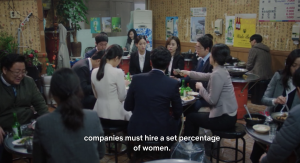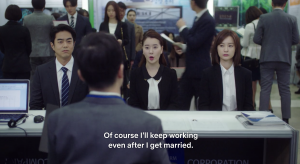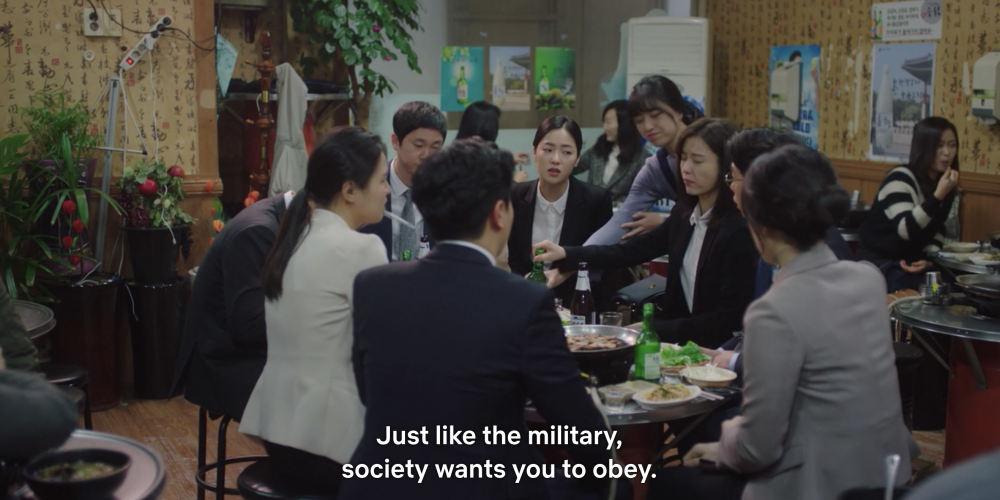Author: Sophie Rock
Synopsis:
In episode 1 and 2 of the popular Korean drama series Live, viewers are introduced to the main characters and their introduction to life in the Police Academy. Introduced as short on her luck, Han Jeong-o looks for employment whilst living at home with her unstable mother. Yeom Sang-su, intern at Serai Water, convinces his family and friends to invest heavily in his soon-to-collapse company. After unsuccessful interviews and the loss of employment and savings, both Han Jeong-o and Yeom Sang-su apply to the Police Academy for hopes of a second chance.
Discussion:
Nearly immediately, the first episode portrays corporate life as an extremely competitive and hostile environment. We know that Korean corporate life is extremely taxing, but how do those dynamics play out when looking at gender? The gendered playing field in the Korean corporate world is one filled with competition, leaving women workers behind due to archaic notions of male power and motherly duties.
As South Korea continues its trajectory into a rapidly industrializing society, jobs are becoming more and more sporadic. The transition from school to work is becoming increasingly competitive in a once streamlined process. However, unstable employment is nearly 7% higher among women as compared to men (Byun 2018, 8). This gendered difference is highlighted in Live, as viewers watch Han Jeong-o struggle to find employment, despite attending multiple interviews and job fairs, while Yeom Sang-su struggles in his career, yet still has a job. Han Jeong-o is not alone in this struggle, either. Other women are clearly discouraged, complaining that “Korea is ranked seventh from the bottom” in terms of female employment (ep. 1, 15:44).

As we discussed in our lecture on Demographic Changes, males are often seen as more fit for employment as compared to female workers. Despite a declining birth rate and increasing marital age, women are still seen as less desirable hires due to perceived familial duties and likeliness to become future mothers (Patterson and Walcutt 2014, 22). The male perspective on this issue reflects these facts. After having been offered positions with companies Winner and Real, Han Jeong-o’s male colleague announces he’ll pay for dinner. Han Jeong-o, having interviewed with both companies, questions why her male colleague was hired over her,to which he responds, “Men are easier to order around” (ep. 1, 16:25). It is clear that the gendered differences are noticed, as Han Jeong-o later states, “What really bugs me is the fact that men who hold the power in our society only see the world from a narrow viewpoint…” sharing that the male perspective on women in the workforce is wrong, after being subjected to sexist interview remarks (ep. 1, 16:50-16:58).


Overall, Live’s representation of the gender dichotomy in the corporate world seems to accurately reflect the reality of male power and the interpretation of female domestic roles in the workplace. Following these episodes, I urge you to consider several things:
- Is the assumption of future familial responsibilities and maternal leave a reasonable factor in the hiring process?
- Han Jeong-o states that she believes the country should pay back men for their military services, rather than individual companies, in response to the fact that men make 7 times more than women in their starting salary (ep. 1, 16:04). Do you agree that men should be compensated in some way for their military services? If so, who should be responsible for this compensation?
- How unique is this gender discrepancy in your opinion? Without looking at factual breakdown, do you consider Korea to have more gender discrimination in the workforce than in other countries?
Bibliography:
Byun, Geumsun. “School-to-work transitions in South Korean young adults: Stratified or Individualized?” Asian Social Work and Policy Review (2018): 1-14. 10.1111/aswp.12148.
Patterson, Louise, Brandon Walcutt. “Explanations for Continued Gender Discrimination in South Korean Workplaces.” Asia Pacific Business Review 20, no. 1 (2013): 18-41. 10.1080/13602381.2013.818805.

Nice first blog Sophie, good example to set for future blogs in your group.
You don’t need a date accessed for journal articles that have a publication date, unless they are in online journals (that don’t have a physical edition).
Although the issue on gender discrepancy may occur in any country, but I do think that Korea has more gender discrimination in the workforce than in other countries. I think for the matter of such discrepancy in the workforce in Korea has a big influence from its patriarchal society and the culture Koreans live with. Korea, since establishment, has not yet experienced many groups questioning the country’s norm until the past decade, where we see more and more younger generations (age around Han Jeong-o or younger) starting to question the norms that the Korean society abide with, which consists of the matter of gender discrepancy. However unlike the younger generations, the other older generations seem to care less on the severity of the need for change. For example in a conflict between Korean mother-in-law and daughter-in-law on husband support, it is not rare to hear the mother-in-law to use the idea of ‘men are sky (up above) and women are land (down below)’ as one of her reason as to why a wife needs to praise the husband. The surprising thing is that it is the mother-in-law saying this, who is also a woman. And this kind of cultural norm and mindset, even just among the older generations, become problems in the modern society because majority of higher positions within companies may be the older generations whom have the same patriarchal mindset that the wife and the mother of own have supported. Overall, I think that the gender issue is more severe in Korea than other countries and in order for any change to occur initially, I think that it would be more influential for each individual household need to acknowledge and practice for change, rather than at places like companies where it is the place where the mindset becomes the behaviour.
I already knew that Korean women struggled more to find a job than men because I saw that my female cousins struggled more to get a job than my male cousins. However, after I watched the first episode, I felt more the reality of Korean society that there is a gender discrimination in workplace because in Korean workplace, there is a hierarchy, and most higher positions are held by old generation people who have a prejudice that men are more powerful than women and prefer men to women. Also, Korean society is patriarchal, so men are usually priority. Due to these reasons, I think that the gender discrepancy in workplace is occurred more in Korea than in other countries such as Canada, even though there is definitely a gender discrepancy as well. In comparison with Canada, South Korea is unfair towards females in workplace because when females are interviewed, they are sometimes asked private questions such as pregnant, marital status, and so on. Also, females are often demanded that should wear uncomfortable clothes like high heeled shoes or skirts and have favourable impression. However, I heard from my female cousins who are working in Canada that most Canadian workplaces consider of ability of work completion more importantly. In my opinion, the gender discrepancy in workplace should not be occurred, especially in Korea, where has more severe gender discrimination, so I think that for the change, the young generation people should break the prejudice that old generation people have.
I think this gender discrepancy is unreasonable in this current society. Compared to the past generations, the gender inequality in the workforce has diminished but unfortunately, it still exists today. This is an issue to most or all the countries but, I believe that Korea is one of the countries where the gender discrepancy in the workforce is in the higher spectrum compared to others. I have not witnessed this issue personally but after watching the first episode of “Live”, I was able to clearly observe how atrocious the gender discrimination is in Korean workforce. Korea has been a patriarchal society since way back, where male has the dominant power and knowledge while female was nothing but a housewife making food and babies. It only has been several decades where women were officially allowed to be educated and get a job, because of the stereotype where men has the leadership, power, knowledge and wealth which came from the experiences in war and such. Because of these factors, women were forced back while men had the priorities and were in a favourable conditions when applying to jobs. Although many people and the media say that the gender discrimination has been diminished, it still exists. For example, in the drama one of the interviewer asked a sexist question to Han Jeong O which was about the familial duties such as baby sitting and groceries. Yes, married women who cannot come to work often or stay late would have a negative impact on working environment and the connections between workers. However, asking these kinds of questions and pressuring the women in interview is a strong act of gender discrepancy. From the media and my own observation about the gender inequality in the workforce in Vancouver doesn’t seem exist. At least nowhere near in comparison to Korea. In conclusion, I believe that gender discrepancy is something that should be erased from all societies, something that the current generations should work on to improve on and not make the same mistake as the previous generations have done.
Although the issue on gender discrepancy may occur in any country, but I do think that Korea has more gender discrimination in the workforce than in other countries. I think for the matter of such discrepancy in the workforce in Korea has a big influence from its patriarchal society and the culture Koreans live with. Korea, since establishment, has not yet experienced many groups questioning the country’s norm until the past decade, where we see more and more younger generations (age around Han Jeong-o or younger) starting to question the norms that the Korean society abide with, which consists of the matter of gender discrepancy. However unlike the younger generations, the other older generations seem to care less on the severity of the need for change. For example in a conflict between Korean mother-in-law and daughter-in-law on husband support, it is not rare to hear the mother-in-law to use “men are sky (up above) and women are land (down below)” as one of her reason as to why a wife needs to praise the husband. The surprising thing is that it is the mother-in-law saying this, who is also a woman. And this kind of cultural norm and mindset, even just among the older generations, become problems in the modern society because majority of higher positions within companies may be the older generations whom have the same patriarchal mindset that the wife and the mother of own have supported. Overall, I think that the gender issue is more severe in Korea than other countries and in order for any change to occur initially, I think that it would be more influential for each individual household need to acknowledge and practice for change, rather than at places like companies where it is the place where the mindset becomes the behaviour.
As Sophie mentioned in her synopsis of episode 1 and 2, for me, it is tragic that a lot of Koreans are only seeking for stable jobs that pay them consistent amounts of salary, hoping to have “stable” lives without choosing the jobs that they actually like. Like in the drama, the gender discrepancy was always an issue in Korea; for example, salary differences, acceptance rate, and so on. Nowadays, it is so common that the married couples are agreeing not to have a baby before they are “stabilized.” The reason for the lowest fertility rate can be answered easily as Doctor Saeji mentioned in her lecture. To be honest, Korea is trying to encourage the married couples to have more than 2 children, but I believe that it would not be possible for these days; in our parents’ generation, it was possible for the families to survive with a single breadwinner in one family. However, in our generation, having one breadwinner would not be enough to take care of the whole family. Therefore, females are seeking to have jobs like the males, hoping that they would be considered as the same working material as the males. However, it clearly shows that females are facing more difficulties finding jobs like Han- Jeong O, since they are considered as “gi-pi-dae-sang,” meaning that they will be filtered out because of their gender. As a female, it is so sad that I am living in a world where the gender discrepancy still exists, but I believe that the reality is tougher and it is ongoing problem that cannot be fixed so simply.
Hello everyone,
Sophie did an excellent job in pointing out the issues where relevant and supporting her claims with statistics, quotations, and some great lines from these poignantly-written scenes in the drama. We haven’t had the chance to discuss masculinity and military service yet, but that will help you unpack the other side – some of the attitudes about men in society that you’ve already outlined in discussing their effects on women.
I see that most of you chose to answer the third question (though they all were very specific and insightful). Although anecdotes may help you prove your point, try not to base your point solely off your experiences and understandings, as they could be generalizations or isolated incidents – connecting your experience to lectures and discussions in a meaningful way, as Alice has, is a good way to refine your understanding and tailor your argument more effectively.
1.Is the assumption of future familial responsibilities and maternal leave a reasonable factor in the hiring process?
In my point of view our life is based on assumptions and certainty rarely takes part in our daily lives. Assuming based on gendered patterns or norms during the hiring process is wrong and inefficient as companies could potentially opt out on one of the best candidates. However, if we change the perspective to corporate view point, we can seem to understand a little why this happens so often. It used to be that female workers would tend to work until their mid or late 20’s and then get married. Looking back couple decades, not only companies but also parents would condemn their daughters if they were not married by their 30’s, giving them a sense of failure and unhappiness. Marriage was a must and having a family was also a cultural norm. It was almost always the case that women would leave the workforce eventually and men would stay at the same company for their whole career; thus, leaving men as a more desirable worker. When a company hires a new worker, the company loses money as the time it takes and the effort to train a new employee is not as simple as it sounds and requires significant attention which can be spent elsewhere. When a company invests in a person, they expect lucrative return on investment, which in this case is the employee staying with the firm for a significant period of time. However, the cultural norm made and forced women to leave, giving companies the assumption today that female workers will leave the company eventually and entitling them with responsibilities or training them was not as profitable when compared to men. However, today we realize that this is not true but it is the mindset of the corporate officials that are still trapped in the past.
I do love Korean dramas and other Asia’s series and movies. That is why I was determined to make a new site for all my favorite Asian Drama World. In a new world like today, I don’t think women are less competitive than men. But I’ve seen a lots of k-drama and I now that employment between men and women are equal and it is always the idea of what a man/woman can do to a certain company. There is always exemptions if physical strength are weigh in the line of job like labor job…. But for me, sooner or later all other countries like the Philippines will have gender equality and its nice to see the future with equal rights.